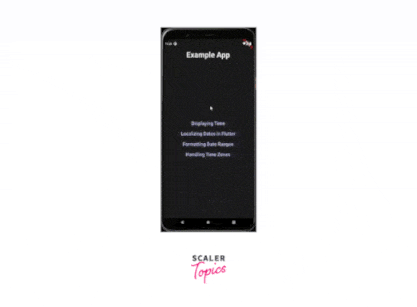How to Format Dates in Flutter?
Overview
Dates are a very important aspect of many applications and regardless of the platform for which the application is being built, we need to take special care of them. The Dates need to be properly formatted in order to provide a decent user experience. Flutter provides us with a range of tools that allow us to do date formatting pretty easily by being able to display dates in some specific format, handling time-zone conversions, while also being able to localize them for different languages. By the end of this article, you will be familiar with various ways to format dates in Flutter.
Understanding Dates in Dart
As we have already mentioned that Dart is the language on which Flutter is based, we will first look into how dates are formatted in Dart before jumping to the Flutter part of the same thing. Dart comes with a built-in class called 'DateTime'. It provides us to perform a range of operations such as retrieving the current date and time, comparing dates, and adding or subtracting time durations.
Formatting Dates in Flutter
We use the intl package to format dates in Flutter. The major advantage of using the intl package lies in the fact that it provides localization support and a set of classes for formatting dates, numbers, and other types of data. We can add the intl package to our flutter project by simply including it in the pubspec.yaml file and then running the flutter pub get in our terminal to fetch the required dependencies.
1. Formatting dates using default formats:
We can use the DateFormat in Flutter to use the various predefined formats which are offered by the class. for instance the DateFormat.yMd() is used to format dates in the year/month/day format. Similarly, DateFormat.EEEE() is used for formatting the full weekday name, and DateFormat.jms() for formatting time in hour:minute:second format. The DateFormat in Flutter is popularly used due to the ease of using it.
2. Customizing Date Formats
Flutter provides the developers with the methods like 'addPattern()' and 'setPattern()' that enable developers to specify their own date format patterns.
3. Localization of the Dates
The users of your Flutter application might belong to different regions and locales. We need to take care of this fact and therefore have to present the dates in such a manner that it aligns with their preferences. We can automatically format dates accordingly by using the 'DateSymbols' object along with the DateFormat in Flutter.
4. Relative Time Formatting
Sometimes, it is a better idea to show the relative time such as "Just Now", "2 minutes ago", or "Yesterday", etc. in contrast to displaying the exact time. The 'Intl' class provides convenient methods like 'Intl.relativeTime()' to format dates relative to the current time.
Localizing Dates in Flutter
It is the process of creating an application such that it can adapt to different countries, regions, and time zones. The intl package helps in this localization. We have to provide the appropriate locale parameter when formatting dates with DateFormat in order to display the dates in the correct format. This allows us to format the dates for different languages. For example, the intl package helps us to display the dates in French, German or Dutch locales differently.
Formatting Date Ranges
While working with the date ranges, we are often required to present them in a concise and meaningful manner. The intl package provides several powerful tools for the same job. For the job of formatting the date ranges, we first need to define the start and end dates of the range. Then we create an instance of the DateFormat with the desired format pattern. Finally, we format the start and end dates and then display it.
Handling Time Zones
The users of our application might belong to different time zones as well. We have the 'timezone' package which offers functionalities to work with different time zones. We can convert the dates from one time zone to another accurately and present the time regardless of the user's location.
Example App
Github Repository link : scaler_format_dates
This is the demo of the Example App which we have built by combining all the essential utilities related to formatting dates in flutter.

main.dart File
Github link : main.dart
demo.dart File
Github link: demo.dart
This file redirects us to all the other files.
displaying_time.dart File
Github link: displaying_time.dart
The code below demonstrates the usage of DateFormat in Flutter. Here, we are simply displaying the current time using the DateFormat in Flutter.
localizing_dates.dart File
Github link: localizing_dates.dart
formatting_date_ranges.dart File
Github link : formatting_date_ranges.dart
handling_time_zones.dart File
Github link: handling_time_zones.dart
Conclusion
- Formatting dates in Flutter is a crucial aspect of creating a user-friendly and localized application.
- By using the intl package, developers can easily format dates using default formats or customize them based on specific requirements.
- Additionally, localizing dates ensures that they are displayed in a culturally appropriate manner for users of different locales.
- When dealing with date ranges, Flutter offers the flexibility to format them effectively using symbols, additional text, or localized formats. This allows for a concise and meaningful representation of date ranges in the application.
